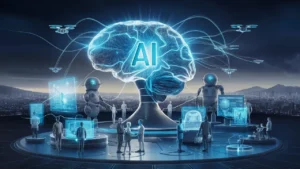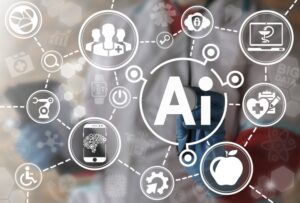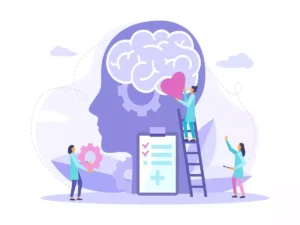The Future of AI: How Artificial Intelligence Will Shape Our Lives
Artificial Intelligence (AI) has already begun to make waves in various sectors, from healthcare to finance, education to entertainment. But the future of AI is much more expansive, offering transformative potential in how we work, interact, and live. In this guide, we’ll explore the key areas where AI is poised to shape our lives in the near and far future.
1. What is Artificial Intelligence?
Artificial Intelligence refers to the development of computer systems that can perform tasks typically requiring human intelligence. These tasks include learning from data (machine learning), recognizing patterns (computer vision), understanding and generating language (natural language processing), and decision-making (autonomous systems). AI systems range from simple algorithms used in everyday applications (like email filtering) to advanced models powering robots and self-driving cars.

2. The Current State of AI
While AI is still in its early stages, it’s already integrated into many aspects of modern life:
- Voice Assistants: Tools like Siri, Alexa, and Google Assistant help with tasks, set reminders, answer questions, and control smart home devices.
- Recommendation Systems: AI algorithms suggest products, movies, music, and more based on your preferences (think Netflix or Spotify).
- Healthcare: AI helps diagnose medical conditions, analyze medical images, and even predict disease outbreaks.
- Finance: AI is used in fraud detection, algorithmic trading, and personal finance tools.
Despite these advancements, we’re still in the early phases of realizing AI’s true potential. However, looking ahead, AI will likely have an even more profound impact on society.

3. How AI Will Shape the Future
1. Revolutionizing Healthcare
- AI-Powered Diagnostics: AI systems will continue to improve diagnostic accuracy. For example, AI can analyze medical images (like X-rays, MRIs, and CT scans) faster and more precisely than human doctors in some cases. In the future, AI could predict medical conditions early, even before symptoms appear, by analyzing genetic data, lifestyle choices, and environmental factors.
- Personalized Medicine: AI will enable the development of tailored treatments based on an individual’s genetic makeup and personal health data, leading to more effective and targeted therapies.
- Robotic Surgery: AI-driven robots will assist in complex surgeries, increasing precision and reducing human error, ultimately improving patient outcomes.
- Virtual Health Assistants: AI-powered chatbots and virtual assistants will provide 24/7 healthcare advice, monitor health metrics, and even remind patients to take medication.
2. Autonomous Vehicles and Transportation
- Self-Driving Cars: AI is the backbone of autonomous driving technology. In the future, we could see a world with self-driving cars, reducing accidents caused by human error, improving traffic flow, and making transportation more accessible for people with disabilities or the elderly.
- Autonomous Delivery Systems: AI will power drones and robots to deliver goods, whether it’s food, packages, or medical supplies. This could lead to faster and more efficient deliveries while reducing the carbon footprint associated with traditional transportation.
- Smart Cities: AI will be used to manage everything from traffic lights to public transportation schedules, making cities more efficient and environmentally friendly.
3. AI in the Workplace
- Automation and Productivity: Many repetitive and mundane tasks, such as data entry, customer service inquiries, and inventory management, will be handled by AI-powered systems. This will allow human workers to focus on more complex and creative tasks, ultimately improving productivity.
- Collaborative AI Tools: AI will enhance the capabilities of human workers by offering real-time data analysis, helping with decision-making, and offering insights for innovation. For instance, in sectors like marketing, design, and content creation, AI tools can assist with idea generation, personalized recommendations, and even creative outputs.
- Job Transformation: While some jobs may be replaced by automation, AI will also create new roles that we can’t yet foresee, particularly in the fields of AI maintenance, data science, and algorithm development. Upskilling and reskilling workers will be essential to adapting to these changes.
4. AI and Education
- Personalized Learning: AI will revolutionize education by offering highly personalized learning experiences. AI systems can assess students’ strengths and weaknesses and provide customized lesson plans that adapt to their individual learning styles.
- AI Tutors: Virtual tutors will help students at all levels, providing instant feedback, explanations, and additional resources. AI could even simulate real-world environments for experiential learning, like virtual labs for science experiments or historical simulations.
- Automated Administrative Tasks: AI will assist educators by automating administrative duties such as grading, attendance tracking, and scheduling, freeing up more time for teaching.
5. AI in the Home
- Smart Homes: AI will make homes more intelligent by managing everything from lighting and temperature to security and appliances. Imagine a home that learns your daily habits and adjusts to your preferences automatically, whether it’s adjusting the thermostat when you’re coming home or notifying you when your groceries are running low.
- Personal Assistants: Beyond managing your calendar, AI will be able to anticipate your needs more effectively, such as ordering food based on your past preferences or suggesting movies when you mention being bored.
- Elderly Care: AI-powered robots and sensors will assist elderly individuals in their daily lives, providing companionship, reminders for medication, and even emergency assistance.
6. Ethical and Societal Impacts
- Privacy Concerns: As AI systems collect vast amounts of data to function effectively, there will be growing concerns over privacy and data security. How data is collected, stored, and used will need to be regulated to prevent misuse and exploitation.
- Bias and Fairness: AI systems can inherit biases present in the data they are trained on. As AI becomes more involved in decision-making processes (e.g., hiring, law enforcement, and lending), it’s crucial to ensure that these systems are free of biases that could harm marginalized groups.
- AI Governance: Governments, organizations, and international bodies will need to develop policies and frameworks to ensure AI is developed and used ethically, safely, and transparently.
7. AI and Creativity
- AI in Art and Music: AI is already being used to generate art, music, and literature. In the future, AI could work alongside artists to push the boundaries of creativity. These systems will not only assist in the creative process but also produce original works that may challenge traditional notions of authorship and creativity.
- Entertainment Personalization: Streaming platforms like Netflix and Spotify already use AI to recommend content based on user preferences. In the future, AI will create fully personalized entertainment experiences, from interactive movies to dynamic music that adapts to the listener’s mood.

4. Challenges and Considerations
While AI presents numerous opportunities, it also comes with challenges:
- Job Displacement: Automation could replace certain jobs, leading to unemployment for some workers. However, this could be mitigated by focusing on reskilling and creating new job opportunities in the AI sector.
- AI Safety and Control: As AI systems become more complex, there will be a need to ensure they remain under human control, especially in critical areas like autonomous weapons or decision-making in healthcare.
- AI Governance and Ethics: Ensuring AI is developed and used ethically will be a significant challenge. There needs to be clear frameworks and regulations to ensure AI is aligned with human values and interests.



